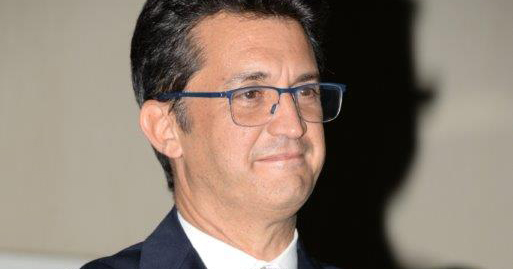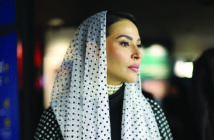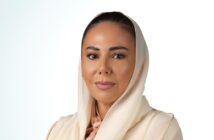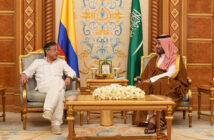An interview with Michele Cervone d’Urso, Head of European Union, Delegation to the Kingdom of Saudi Arabia
By ALEXANDER WOODMAN
The Delegation of European Union (EU) in Riyadh was officially opened in 2004. Currently, it represents the European Union in Saudi Arabia, Bahrain, Oman, as well as to the Secretariat of the GCC. It is a fully accredited diplomatic mission and is one of over 140 EU Delegations around the world.
When discussing the diplomatic ties between the EU and the KSA, as well as the potential of the Kingdom, His Excellency Head of the EU Delegation to the Kingdom of Saudi Arabia Michele Cervone d’Urso emphasized, “Saudi Arabia’s youth is one of the most promising aspects of its future. There is much raw talent, which is being polished and refined through education.”
Can you discuss the bilateral relations between the Kingdom of Saudi Arabia and the European Union since 1988 when the Cooperation Agreement was signed between the GCC and the EU?
There has been a significant focus on the economic cooperation of the EU with the Gulf and the Kingdom. In December 2019, the third EU-GCC business forum was held in Muscat, which currently has the largest Business to Business platform. There have also been several engagements in support of the Saudi reform agenda. The European Commission has unique expertise, knowledge, and know-how in fields such as agriculture, transport, and the internal market space. We can share our own in-house expertise and knowledge.
A key priority has also been engaging on regional issues with the Kingdom. For instance, the Finnish Foreign Minister had visited Saudi Arabia on behalf of the EU to discuss joint actions towards the transition in Sudan. Saudi Arabia is considered to be a crucial donor in this process. A similar collaboration of development is an ongoing process in Yemen, where the Kingdom has always played a significant historical role. The EU delegation in Yemen has been engaged with Saudi authorities on these issues for over ten years. Africa is a further area of engagement and the EU is stepping up cooperation in the Horn of Africa and the Sahel. The Red Sea is of growing significance for both the European Union and the Kingdom and we are discussing opportunities for cooperation with the recently formed Council for the Red Sea and Gulf of Aden.
In December 2019, there was another initiative with the King Faisal Center for Research and Islamic Studies on tolerance and extremism. In 2020, a specific focus will be to open such activities to the Saudi public at the King Faisal Center for Research and Islamic Studies.
The EU-GCC trade has been steadily growing between 2006 and 2016. Apart from the oil dealings, what are the other essential sectors of trade between the EU and the GCC resulting in such significant growth?
Statistically, there has been an increase in trade, although this is not a reliable indicator of long-term success. The EU is still the most significant trade partner in the Gulf, but the market share continues to remain very unstable. There are new actors such as China, which is becoming increasingly active in the region. This should be a wake-up call for Europe to become even more engaged. More attention should be paid to the concept of “market irritants,” which may be relevant in the framework of the EU’s goals with the Saudi Arabian market.
In order to promote trade, there is a process of alleviating European investments to the Kingdom regarding rule-making and burdens. For example, Saudi Arabian General Investment Authority (SAGIA), is at the forefront, addressing relevant trade issues. Furthermore, the Kingdom looks at the EU in terms of standards and regulations, which are the forefront globally. Therefore, it is reasonable for the Kingdom to be able to produce and export using the highest possible benchmark adopted from the EU.
Since the last negotiations focused on the creation of the GCC-EU free trade agreement (FTA) in 2009, the economic reality of the GCC has changed. What has changed in the EU and what are the factors needed to restart these negotiations?
The EU-GCC free trade agreement negotiations are the most prolonged negotiations between any entities working on free trade agreements. The negotiations began in 1988 and were suspended in 2008, as the EU was not willing to accept export subsidies from the Gulf. Since then, both economies have drastically changed. The current “trend” is focused on diversification, and there is less dependence on petrochemicals. There is now the “Green Deal,” which is a new strategy in Europe. Their goals are to make the economy of the EU more resource-efficient and competitive and decrease greenhouse gas emissions from member States. The long drive towards new and cleaner technology has dramatically altered the course of the economy. With several other external and internal factors having been added, the pace is almost too complicated to follow carefully.
Currently, there are efforts to restart the negotiations. The issue is that it is impossible to begin where the deal has been left 11 years ago since the latest generations of the FTA are already quite different. It is essential to take into account all of the changes, not only within the European and the Gulf economies but also globally. Saudi Arabia has developed new industries that must also be considered. The EU has new leadership in Brussels, and the Kingdom has the Ministry of Commerce and Governor Trade Authority that are working in close collaboration with each other, and the GCC Secretariat. Hopefully, progress will be made soon.
It is also important to bear in mind that the Kingdom is taking over the G20. The first Sherpa meeting was held in Riyadh on the fourth and the fifth of December, 2019. The scope was extensive, and most of the issues align closely with the EU agenda. The reform of the World Trade Organization, the digital economy and climate change are some of the key priorities.
How is your life in the Diplomatic Quarter?
Living in the Diplomatic Quarter (DQ) has been a significant part of me and my family’s personal livelihood transformation in the Kingdom. When I first arrived, we lived in a residential compound where we had difficulties in engaging with Saudis. Moving to the DQ has made it easier to meet people. The beauty of the DQ is that it is not only a diplomatic bubble; there are many Saudis who socialize and live in the DQ. Compared to the first year of my stay, I have been privy to many activities including concerts, social events, restaurant openings, etc. The DQ has become quite the bustling part of Riyadh, and it is thoroughly enjoyable.
We also enjoy the surrounding areas of Riyadh and outdoor life. We usually go to the deserts and different parks in and around Riyadh. My new favorite is the Riyadh Festival. I recently visited Diriyah which is a gem and the Commission is doing a great job in organizing visits and spectacular shows. Part of the transformation is that virtually everyone, Saudis and foreigners alike, are living much more outside.
In my three years, I have witnessed an upgrade of the hotels and restaurants in the DQ and throughout Riyadh – we now have some of the very top, globally in Riyadh, and there is no need to travel abroad!




